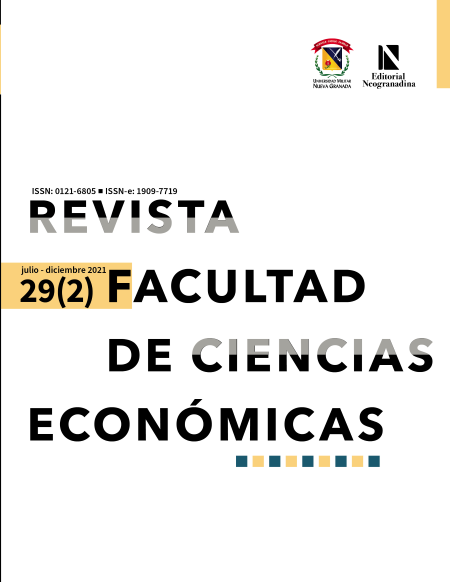Benefits of Using Digital Technologies in External Auditing
a Literature Review
Abstract
This article is the result of the systematic revision of the accounting and information systems Literature, focused in including/understanding the benefits of the use of digital technologies in the audit process. Based on the objective, the research question that guided this literature review was posed: what are the benefits that the use of digital information technologies brings to the external audit process? The methodology used consisted in the selection and analysis of 50 documents, extracted from journals in the Scopus database, out of a total of 3,649 research articles from 38 different journals. Likewise, for each phase of the audit process, the main emerging digital technologies related to the external audit process, types of methodologies and approaches of the authors and, finally, results and findings found by the authors were analyzed. Most of the authors consulted agree that digital technologies can change the current focus of the audit, going from a periodic review to an ongoing one and that the use of digital technologies could generate efficiencies and optimization in the general audit process.
Downloads
References
Abou-El-Sood, H., Kotb, A. y Allam, A. (2015). Exploring auditors’ perceptions of the usage and importance of audit information technology. International Journal of Auditing, 19(3), 252-266. https://doi.org/10.1111/ijau.12039
Ahmad, F. (2019). Una revisión sistemática del papel del “Big Data Analytics” en la reducción de la influencia de los errores cognitivos en el juicio de auditoría. Revista de Contabilidad - Spanish Accounting Review, 22(2), 187-202. https://doi.org/10.6018/rcsar.382251
American Institute of Certified Public Accountants [aicpa]. (2018). Accounting guide: brokers and dealers in securities. https://doi.org/10.1002/9781119578864
Al-Htaybat, K. y von Alberti-Alhtaybat, L. (2017). Big data and corporate reporting: impacts and paradoxes. Accounting, Auditing and Accountability Journal, 30(4), 850-873. https://doi.org/10.1108/AAAJ-07-2015-2139
Appelbaum, D. (2016). Securing big data provenance for auditors: the big data provenance black box as reliable evidence. Journal of Emerging Technologies in Accounting, 13(1), 17-36. https://doi.org/10.2308/jeta-51473
Appelbaum, D., Kogan, A. y Vasarhelyi, M. A. (2017). Big data and analytics in the modern audit engagement: research needs. Auditing, 36(4), 1-27. https://doi.org/10.2308/ajpt-51684
Appelbaum, D., Kogan, A., Vasarhelyi, M. y Yan, Z. (2017). Impact of business analytics and enterprise systems on managerial accounting. International Journal of Accounting Information Systems, 25, 29-44. https://doi.org/10.1016/j.accinf.2017.03.003
Appelbaum, D. A., Kogan, A. y Vasarhelyi, M. A. (2018). Analytical procedures in external auditing: a comprehensive literature survey and framework for external audit analytics. Journal of Accounting Literature, 40, 83-101. https://doi.org/10.1016/j.acclit.2018.01.001
Arnaboldi, M., Busco, C. y Cuganesan, S. (2017). Accounting, accountability, social media and big data: revolution or hype? Accounting, Auditing and Accountability Journal, 30(4), 762-776. https://doi.org/10.1108/AAAJ-03-2017-2880
Boland, C. M., Daugherty, B. E. y Dickins, D. (2019). Evidence of the relationship between pcaob inspection outcomes and the use of structured audit technologies. Auditing, 38(2), 57-77. https://doi.org/10.2308/ajpt-52214
Bonsón, E. y Bednárová, M. (2019). blockchain and its implications for accounting and auditing. Meditari Accountancy Research, 27(5), 725-740. https://doi.org/10.1108/MEDAR-11-2018-0406
Borthick, A. F. y Pennington, R. R. (2017). When data become ubiquitous, what becomes of accounting and assurance? Journal of Information Systems, 31(3), 1-4. https://doi.org/10.2308/isys-10554
Chartered Professional Accountants of Canada [cpa Canada] - American Institute of Certified Public Accountants [aicpa]. (2017). blockchain technology and its potential impact on the audit and assurance profession. https://bit.ly/3wtrUZ1
Chukwudi, O., Echefu, S., Boniface, U. y Victoria, C. (2018). Effect of artificial intelligence on the performance of accounting operations among accounting firms in South East Nigeria. Asian Journal of Economics, Business and Accounting, 7(2), 1-11. https://doi.org/10.9734/ajeba/2018/41641
Cong, Y., Du, H. y Vasarhelyi, M. A. (2018). Technological disruption in accounting and auditing. Journal of Emerging Technologies in Accounting, 15(2), 1-10. https://doi.org/10.2308/jeta-10640
Cooper, L. A., Holderness, D. K., Sorensen, T. L. y Wood, D. A. (2019). Robotic process automation in public accounting. Accounting Horizons, 33(4), 15-35. https://doi.org/10.2308/acch-52466
Dagilienė, L. y Klovienė, L. (2019). Motivation to use big data and big data analytics in external auditing. Managerial Auditing Journal, 34(7), 750-782. https://doi.org/10.1108/MAJ-01-2018-1773
Enget, K., Saucedo, G. D. y Wright, N. S. (2017). Mystery, Inc.: a big data case. Journal of Accounting Education, 38, 9-22. https://doi.org/10.1016/j.jaccedu.2016.12.003
Fay, R. y Negangard, E. M. (2017). Manual journal entry testing: data analytics and the risk of fraud. Journal of Accounting Education, 38, 37-49. https://doi.org/10.1016/j.jaccedu.2016.12.004
Gepp, A., Linnenluecke, M. K., O’Neill, T. J. y Smith, T. (2018). Big data techniques in auditing research and practice: current trends and future opportunities. Journal of Accounting Literature, 40, 102-115. https://doi.org/10.1016/j.acclit.2017.05.003
Hooda, N., Bawa, S. y Rana, P. S. (2020). Optimizing fraudulent firm prediction using ensemble machine learning: a case study of an external audit. Applied Artificial Intelligence, 34(1), 20-30. https://doi.org/10.1080/08839514.2019.1680182
Hsieh, T.-S., Kim, J.-B., Wang, R. R. y Wang, Z. (2020). Seeing is believing? Executives’ facial trustworthiness, auditor tenure, and audit fees. Journal of Accounting and Economics, 69(1), 101260. https://doi.org/10.1016/j.jacceco.2019.101260
Huang, F. y Vasarhelyi, M. A. (2019). Applying robotic process automation (rpa) in auditing: a framework. International Journal of Accounting Information Systems, 35, 100433. https://doi.org/10.1016/j.accinf.2019.100433
Institute of Chartered Accountants in England and Wales [icaew]. (2018). blockchain and the future of finance. https://bit.ly/3hJzURf
Issa, H., Sun, T. y Vasarhelyi, M. A. (2016). Research ideas for artificial intelligence in auditing: the formalization of audit and workforce supplementation. Journal of Emerging Technologies in Accounting, 13(2), 1-20. https://doi.org/gffgmt
Kogan, A., Mayhew, B. W. y Vasarhelyi, M. A. (2019). Audit data analytics research—an application of design science methodology. Accounting Horizons, 33(3), 69-73. https://doi.org/10.2308/acch-52459
Köhler, A. y Quick, R. (2018). Editorial: opportunities for innovative auditing research. International Journal of Auditing, 22(3), 329-331. https://doi.org/10.1111/ijau.12141
Kokina, J. y Davenport, T. H. (2017). The emergence of artificial intelligence: how automation is changing auditing. Journal of Emerging Technologies in Accounting, 14(1), 115-122. https://doi.org/10.2308/jeta-51730
La Torre, M., Botes, V. L., Dumay, J., Rea, M. A. y Odendaal, E. (2018). The fall and rise of intellectual capital accounting: new prospects from the big data revolution. Meditari Accountancy Research, 26(3), 381-399. https://doi.org/gdfm
Manita, R., Elommal, N., Baudier, P. y Hikkerova, L. (2020). The digital transformation of external audit and its impact on corporate governance. Technological Forecasting and Social Change, 150, 119751. https://doi.org/10.1016/j.techfore.2019.119751
Marshall, T. E. y Lambert, S. L. (2018). Cloud-based intelligent accounting applications: accounting task automation using ibm watson cognitive computing. Journal of Emerging Technologies in Accounting, 15(1), 199-215. https://doi.org/ggmwtr
Moll, J. y Yigitbasioglu, O. (2019). The role of internet-related technologies in shaping the work of accountants: new directions for accounting research. The British Accounting Review, 51(6), 100833. https://doi.org/10.1016/j.bar.2019.04.002
Montoya Hernández, A. Y. y Valencia Duque, F. J. (2020). Inteligencia artificial al servicio de la auditoría: una revisión sistemática de literatura. Revista Ibérica de Sistemas e Tecnologias de Informação, (E27), 213-226. http://www.risti.xyz/issues/ristie27.pdf
Munoko, I., Brown-Liburd, H. L. y Vasarhelyi, M. (2020). The ethical implications of using artificial intelligence in auditing. Journal of Business Ethics, (167), 209-234. https://doi.org/10.1007/s10551-019-04407-1
No, W. G., Lee, K., Huang, F. y Li, Q. (2019). Multidimensional audit data selection (mads): a framework for using data analytics in the audit data selection process. Accounting Horizons, 33(3), 127-140. https://doi.org/10.2308/acch-52453
Omoteso, K. (2012). The application of artificial intelligence in auditing: looking back to the future. Expert Systems with Applications, 39(9), 8490-8495. https://doi.org/https://doi.org/10.1016/j.eswa.2012.01.098
Rao, A. S. y Verweij, G. (2017). Sizing the prize. PwC. https://pwc.to/3woKgdr
Raschke, R. L., Saiewitz, A., Kachroo, P. y Lennard, J. B. (2018). AI-enhanced audit inquiry: a research note. Journal of Emerging Technologies in Accounting, 15(2), 111-116. https://doi.org/10.2308/jeta-52310
Richins, G., Stapleton, A., Stratopoulos, T. C. y Wong, C. (2017). Big Data Analytics: opportunity or threat for the accounting profession? Journal of Information Systems, 31(3), 63-79. https://doi.org/10.2308/isys-51805
Rose, A. M., Rose, J. M., Sanderson, K. A. y Thibodeau, J. C. (2017). When should audit firms introduce analyses of big data into the audit process? Journal of Information Systems, 31(3), 81-99. https://doi.org/10.2308/isys-51837
Rozario, A. M. y Thomas, C. (2019). Reengineering the audit with blockchain and smart contracts. Journal of Emerging Technologies in Accounting, 16(1), 21-35. https://doi.org/10.2308/jeta-52432
Sakunthala, S., Kiranmayi, R. y Mandadi, P. N. (2017). A review on artificial intelligence techniques in electrical drives: neural networks, fuzzy logic, and genetic algorithm. 2017 International Conference on Smart Technologies for Smart Nation (SmartTechCon), pp. 11-16. https://doi.org/10.1109/SmartTechCon.2017.8358335
Salijeni, G., Samsonova-Taddei, A. y Turley, S. (2019). Big data and changes in audit technology: contemplating a research agenda. Accounting and Business Research, 49(1), 95-119. https://doi.org/10.1080/00014788.2018.1459458
Shaffer, K. J., Gaumer, C. J. y Bradley, K. P. (2020). Artificial intelligence products reshape accounting: time to re-train. Development and Learning in Organizations, 34(6). https://doi.org/10.1108/DLO-10-2019-0242
Sun, T. S. (2019). Applying deep learning to audit procedures: an illustrative framework. Accounting Horizons, 33(3), 89-109. https://doi.org/10.2308/acch-52455
Sun, T. y Vasarhelyi, M. A. (2018). Embracing textual data analytics in auditing with deep learning. The International Journal of Digital Accounting Research, 18, 49-67. https://doi.org/10.4192/1577-8517-v18_3
Tang, J. y Karim, K. E. (2019). Financial fraud detection and Big Data Analytics - implications on auditors’ use of fraud brainstorming session. Managerial Auditing Journal, 34(3), 324-337. https://doi.org/10.1108/MAJ-01-2018-1767
Tiberius, V. y Hirth, S. (2019). Impacts of digitization on auditing: a Delphi study for Germany. Journal of International Accounting, Auditing and Taxation, 37, 100288. https://doi.org/10.1016/j.intaccaudtax.2019.100288
Wang, X. (2020). Reflections on the application of ai in auditing practice in the context of big data. En Z. Xu, K. K. Choo, A. Dehghantanha, R. Parizi y M. Hammoudeh M. (eds.), Cyber Security Intelligence and Analytics. csia 2019. Advances in Intelligent Systems and Computing, 928. Springer, Cham. https://doi.org/gdfn
Wang, Y. y Kogan, A. (2018). Designing confidentiality-preserving blockchain-based transaction processing systems. International Journal of Accounting Information Systems, 30, 1-18. https://doi.org/10.1016/j.accinf.2018.06.001
Zemánková, A. (2019). Artificial intelligence and blockchain in audit and accounting: Literature review. wseas Transactions on Business and Economics, 16, 568-581. https://bit.ly/3hJEnmZ
Zerbino, P., Aloini, D., Dulmin, R. y Mininno, V. (2018). Process-mining-enabled audit of information systems: methodology and an application. Expert Systems with Applications, 110, 80-92. https://doi.org/10.1016/j.eswa.2018.05.030
Zhang, C. (2019). Intelligent process automation in audit. Journal of Emerging Technologies in Accounting, 16(2), 69-88. https://doi.org/10.2308/jeta-52653
Zhaokai, Y. y Moffitt, K. C. (2019). Contract analytics in auditing. Accounting Horizons, 33(3), 111-126. https://doi.org/10.2308/acch-52457











